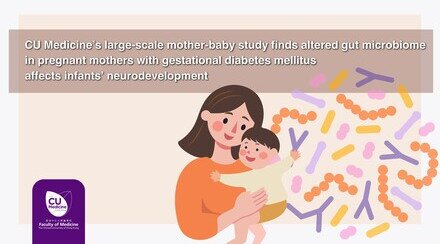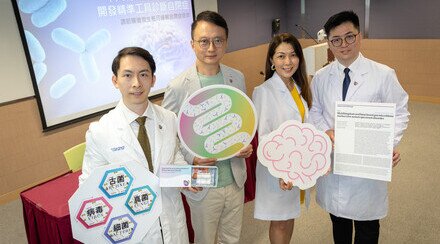CUHK proves its self-developed oral microencapsulated live bacteria formula SIM03 improves disease severity and quality of life in children with eczema
The Chinese University of Hong Kong’s (CUHK) Faculty of Medicine (CU Medicine) has collected extensive data from eczematous young children - those who suffer from eczema - and others who are healthy, used metagenomic analysis to invent the SIM03 live bacteria formula and developed it into an oral formula using microencapsulation technology. A study conducted by CU Medicine has further proved the efficacy of SIM03, which improved the disease severity of eczematous children and their quality of life. Details of the study have been published in Scientific Reports, a publication of the Nature Group.

In the study, 100% of children with moderate eczema improved to mild grade, while 50% of children with severe eczema improved to moderate grade.
Specific bacteria deficient in eczematous children’s gut identified using metagenomics
Eczema is the most common inflammatory skin condition in children. Its severity is influenced by immune cells, and there is still no cure. It is also known as the first step in the “atopic march”, where 30% to 40% of child patients develop additional allergic diseases such as asthma or allergic rhinitis in the future. An international study reported that eczema affects up to 20% of children worldwide, while a local survey also found that close to one-third of preschool children in Hong Kong had ever suffered from eczema. Common symptoms include dry skin, itching, scratching, skin thickening and infection, increasing difficulty in dressing and bathing, and having a significant impact on sleep and ability to concentrate and learn. Eczema on the face and limbs can also affect children’s appearance, confidence and emotions, leading to bullying and other issues.
Professor Leung Ting-fan, Alice Ho Miu Ling Nethersole Charity Foundation Professor of Paediatrics from CU Medicine, stated, “The gut microbiota is considered the largest organ in the human body, and microbiome alternation has been shown to contribute to the occurrence, persistence and severity of eczema. Development in gut microbiota research has revolutionised eczema treatment over the past decade. There is hope that the current approach of managing the condition primarily through varying doses of topical corticosteroids and oral antihistamines can gradually evolve into correcting the dysbiosis of gut microbiota, thereby fundamentally improving the problem and reducing the risk of future allergies as the child grows.”
SIM03 is a microbiome formula invented by CU Medicine which contains both a unique group of bifidobacteria and prebiotics. Its novelty consists of the use of a patented microencapsulation technology to protect the viability of the unique group of bifidobacteria, which was identified through big data analysis of large metagenomic datasets of young southern Chinese children, to ensure their delivery to and colonisation of the gut.
Study shows SIM03 can cause eczema severity to drop by at least one level
The research team recruited 20 eczematous preschool children in Hong Kong, aged 1 to 5 years old, to join the study. Most of them had moderate-to-severe eczema. After receiving SIM03 twice daily for three months, both their disease severity and quality of life significantly improved.
This study utilised the SCORing Atopic Dermatitis (SCORAD) score, which is an internationally recognised clinical assessment tool used to evaluate the severity of subjective and objective eczema symptoms. It considers factors such as the extent of eczema involvement and intensity of skin lesions, as well as the degree of pruritus and impact of eczema on sleep. The score is directly proportional to the severity of the condition. Clinical data using SCORAD demonstrated that all the four factors substantially improved in the eczematous subjects after three months of treatment with SIM03, with the total SCORAD score significantly reducing by 43% (25.6 vs 14.6). Details can be found in the following table,
Average score of all subjects at baseline | Average score of all subjects after receiving SIM03 for three months | |
Total SCORAD score (Components include the extent of eczema involvement, intensity of skin lesions and degree of pruritus, and impact of eczema on sleep)
| 25.6 | 14.6 |
Infant’s Dermatitis Quality of Life Index (IDQOL) (Applicable to children aged 1 to 3 years old)
| 10 | 4 |
Children’s Dermatology Life Quality Index (CDLQI) (Applicable to children aged 4 to 5 years old)
| 15 | 8 |
In the study, SIM03 demonstrated a high response rate in moderate to severe eczematous children, leading to a one-level reduction in the total SCORAD score. Specifically, 100% of children with moderate eczema improved to mild grade, while 50% of children with severe eczema improved to moderate grade.
Results demonstrate an improvement in the quality of life for young children with eczema
In terms of quality of life, the study assessed the impact of SIM03 by the Infant’s Dermatitis Quality of Life Index (IDQOL, for 1 to 3 years old) and Children’s Dermatology Life Quality Index (CDLQI, for 4 to 5 years old). The indexes included factors such as reduction in itching and scratching, improvement in sleep, dressing and bathing, reduction in treatment-related issues, and improvement in physical activity. Results showed that after taking SIM03 for three months, the IDQOL of study participants decreased by 60% (from 10 to 4), and the CDLQI decreased by 47% (from 15 to 8). This demonstrates an improvement in the quality of life for young children with eczema.
Faecal samples from study participants were collected for metagenomic sequencing. Compared with baseline, there was an increase in the relative abundance of the unique group of bifidobacteria after one month of treatment. Such children showed a significant reduction in the eczema-related impact on their sleep.
Professor Leung further mentioned that eczema not only causes distress for children, but also pain for parents, who often feel helpless and anxious when watching their children struggling with the disease. This inflammatory skin condition not only affects the physical health of the child, but also puts psychological and emotional stress on the family.
Professor Francis KL Chan, Choh-Ming Li Professor of Medicine and Therapeutics and Director of the Centre for Gut Microbiota Research at CU Medicine, concluded, “Eczema patients need to select targeted probiotics that can benefit their condition. Our team successfully identified the unique group of bifidobacteria that are deficient in eczematous children and invented a unique microbiome formula, SIM03. Our study also substantiates that interventions that restore beneficial bacteria in the gut can improve eczema. This provides important data to design a large-scale clinical trial for elucidating the efficacy and safety of this novel treatment option for eczematous children.”
Different severity level of eczema.

















































